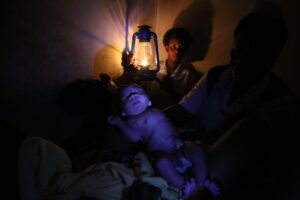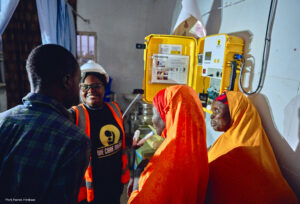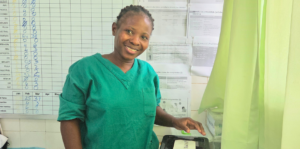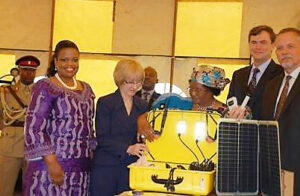 In a celebration of her 100th day in office, Malawi President Joyce Banda received a We Care Solar Suitcase on July 19, 2012, the first of more than a dozen portable solar electric systems headed to Malawi clinics that serve mothers and babies. (In photo, President Banda tested the suitcase. From left are President of the Whitaker Group consulting firm Rosa Whitaker, U.S. Ambassador Jeanine Jackson, President. Banda, USAID Chief Economist Dr. Steve Radelet, and USAID/Malawi Mission Director Doug Arbuckle. Photo Credit: M’baso Photographics.)
In a celebration of her 100th day in office, Malawi President Joyce Banda received a We Care Solar Suitcase on July 19, 2012, the first of more than a dozen portable solar electric systems headed to Malawi clinics that serve mothers and babies. (In photo, President Banda tested the suitcase. From left are President of the Whitaker Group consulting firm Rosa Whitaker, U.S. Ambassador Jeanine Jackson, President. Banda, USAID Chief Economist Dr. Steve Radelet, and USAID/Malawi Mission Director Doug Arbuckle. Photo Credit: M’baso Photographics.)
Mrs. Banda, the first female president of the Republic of Malawi, has made women’s health a focus of her administration through the launch of a Presidential Initiative for Maternal Health and Safe Motherhood.
In a letter to President Banda, We Care Solar co-founder Dr. Laura Stachel wrote, “We are honored to provide these Solar Suitcases to the President of the Republic of Malawi and to the people of Malawi. We are delighted to provide sustainable energy to health clinics to support President Banda’s work in reducing maternal mortality.”
Pregnant Women Required to Bring Candles
With one of the highest rates of maternal mortality in the world, Malawi has a low rate of reliable electricity at health clinics. Some health clinics have no electricity at all and pregnant women are routinely required to bring their own candles when entering a clinic to give birth. The We Care Solar Suitcase will provide a complete electrical system designed for medical use that includes lightweight solar panels, high-efficiency medical lights, fetal monitors, and cell phone charging stations. Each installation will include staff training programs and follow-up.
Doctors and midwives who currently perform emergency deliveries and obstetric procedures by candlelight or in the dark will now have adequate lighting and the ability to communicate.
A generous donor to We Care Solar made the gift of the Solar Suitcases to Malawi possible. Fundraising is underway to support the donation of additional Solar Suitcases to Malawi.
According to the World Health Organization, for every 100,000 live births, 460 mothers in Malawi die as a result of pregnancy and childbirth-related causes. Many countries, including Malawi, are working to show progress toward the 2015 Millennium Development Goal of a 75 percent reduction in maternal mortality rate, even if they will not meet the goal by the deadline.
A Personal Connection for President Banda
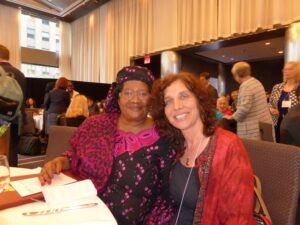
During a visit to the US in June, President Banda noted at an Aspen Institute roundtable on maternal health that she could have died in childbirth herself, had she not received a blood transfusion for postpartum hemorrhaging in time to save her life, according to a report from the Washington-based Center for Strategic and International Studies.
President Banda recounted visiting a clinic where a woman who had given birth at night lost her child because there was no electricity, and it was too dark for health workers to see that the umbilical cord was wrapped around her newborn’s neck.
The We Care Solar Suitcases are slated for use in Malawi clinics that have no access or very limited access to electricity and in which there are at least 20 deliveries per month.
Globally, more than 200,000 clinics in developing countries lack reliable electricity, crippling their ability to provide emergency care to mothers and newborns, to respond to epidemics, and to provide other critical services.




